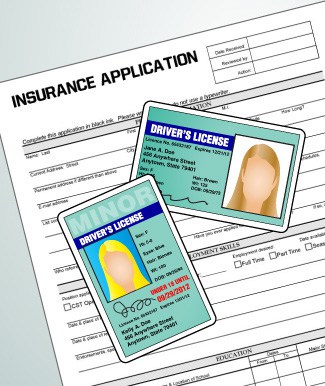6 common mistakes on auto insurance applications
You apply for auto insurance, and maybe you answer a question without thinking, guess at a fact – or even fudge a bit. No big deal, right? Wrong. Experts say that giving an insurer incorrect information can cause you trouble down the road.
“It’s rare that a consumer says, ‘I’m going to fake out this insurance company,’ but people make innocent mistakes on their applications,” says Amy Bach, executive director of United Policyholders, a nonprofit advocacy group for insurance consumers. “And you never know when an insurance company is going to seize on something on your application and make a big deal about it.”
Here are the most common errors, omissions – and, yes, lies – found on auto insurance applications and why you should avoid them:

1. “Teenage driver? What teenage driver?”
Some parents don’t tell their insurance companies about newly licensed teen drivers in the house, in some cases because they fear sky-high premiums, experts say.
“We hear from parents – maybe it’s wishful thinking or just wrong information – that they don’t have to add a teen driver to their policy after they’re licensed,” says Carole Walker, executive director of the Rocky Mountain Insurance Information Association, which educates consumers about insurance issues. “But parents should take the initiative. If they did injure — or, worst-case scenario, kill — someone, you want to make sure you have the appropriate amount of coverage.”
2. “I don’t really drive much at all.”
Many drivers don’t keep detailed mileage records and might not even know the exact length of their commute to work. So that makes it easy to underestimate the yearly miles driven.
“How much you drive – that has always has been a subjective one. People guesstimate, usually on the low side,” Walker says.
But studies have shown that drivers who misreport mileage have higher claim costs than those who are accurate. Therefore, lower-risk drivers are subsidizing higher-risk ones, says Robert U’Ren, senior vice president of Quality Planning, a company that helps insurance companies uncover incorrect information and minimize losses. A report by Quality Planning found insurance companies lost more than $15 billion in 2010 because of incorrect information.
The reason why people misstate mileage “is pretty simple,” U’Ren says. “They want to get a cheaper rate.”
3. “No one else ever drives my car.”
The question of who, aside from the car owner, drives a car can be a tricky one, as some insurance companies charge extra for occasional drivers while others do not, experts say.
“There’s sometimes legitimate confusion over what to report,” U’Ren says. “If my mother-in-law drives to the grocery store once a week, should I report it?”
The biggest mistake is failing to report a risky regular driver who lives in the household – for example, a driver not mentioning her live-in-boyfriend who has a DWI on his record. U’Ren says: “Say the insurance company finds out about this after he crashes her car – they might cancel her policy and (the consequences) could be severe.”
4. “My car is where?”
It seems like an easy question: What is the ZIP code where your car is parked regularly? But some consumers either forget to report when they make a move – such as a student who takes a car to college – or report a secondary address as the primary address because they think it might save some money.
“Say you live in Nevada and you take your car to college at the University of Chicago and it gets broken into,” says Lynette Hoag, owner and managing partner of Hoag Law Group LLC, a Chicago law firm that represents consumers in insurance cases. “If you’re saying that’s where you car is but that’s not really where your car is, it can be a problem.”
Hoag says she’s seen insurers deny claims and launch investigations over this issue.
5. “My driving record is perfect.”
Most consumers know that insurance companies have ready access to records, such as those from motor vehicle departments, to look up the status of their driver’s license, speeding tickets and accident history. But some drivers still neglect to reveal pertinent information.
“You need to reveal the accident history of any car you were driving or that someone else was driving but you carried the insurance on,” Hoag says. “Maybe your boyfriend or girlfriend had an accident in your car, and you tell them, ‘I haven’t had any accidents.’ Well, you might not have, but your car did.”
6. “I never use my car for business.”
The pleasure vs. business question trips up a lot of drivers, experts say.
“The instinct is to say, ‘I drive for pleasure, not for business.’ But what if you get into an accident driving for business and the insurance company finds out you’re driving 50 miles a day for business purposes?” Walker says. “Honesty is the best policy.”
The consequences
So, what happens when a consumer makes a mistake or lies on an auto insurance application? In some cases, the insurance company might never find out. In other cases, the company might find out by hiring a company such as Quality Planning, which conducts checks to verify information – including calling consumers to inquire about their driving habits. Or the insurance company could find out by conducting an investigation after a customer has an accident and files a claim.
“It’s all very case-by-case,” Hoag says. “Did you cause a $100,000 accident or a $5,000 accident?”
Companies are much more likely to investigate an expensive claim, especially if a motorist was injured or killed, Hoag says. Bach agrees: “If a big claim comes in, then suddenly everything gets scrutinized.”
In the worst-case scenario – which Hoag says happens more often with insurers that specialize in insuring high-risk drivers – a company might:
• Refuse to pay the claim and then rescind the policy.
• Pay the claim, but not renew the policy.
• Have charged a higher premium if it had had accurate information, then send the customer a bill.
Bach says: “It will come down to, if the insurance company had known the real situation, would they have acted differently? Would they have charged you more, issued a different policy or changed something?”
